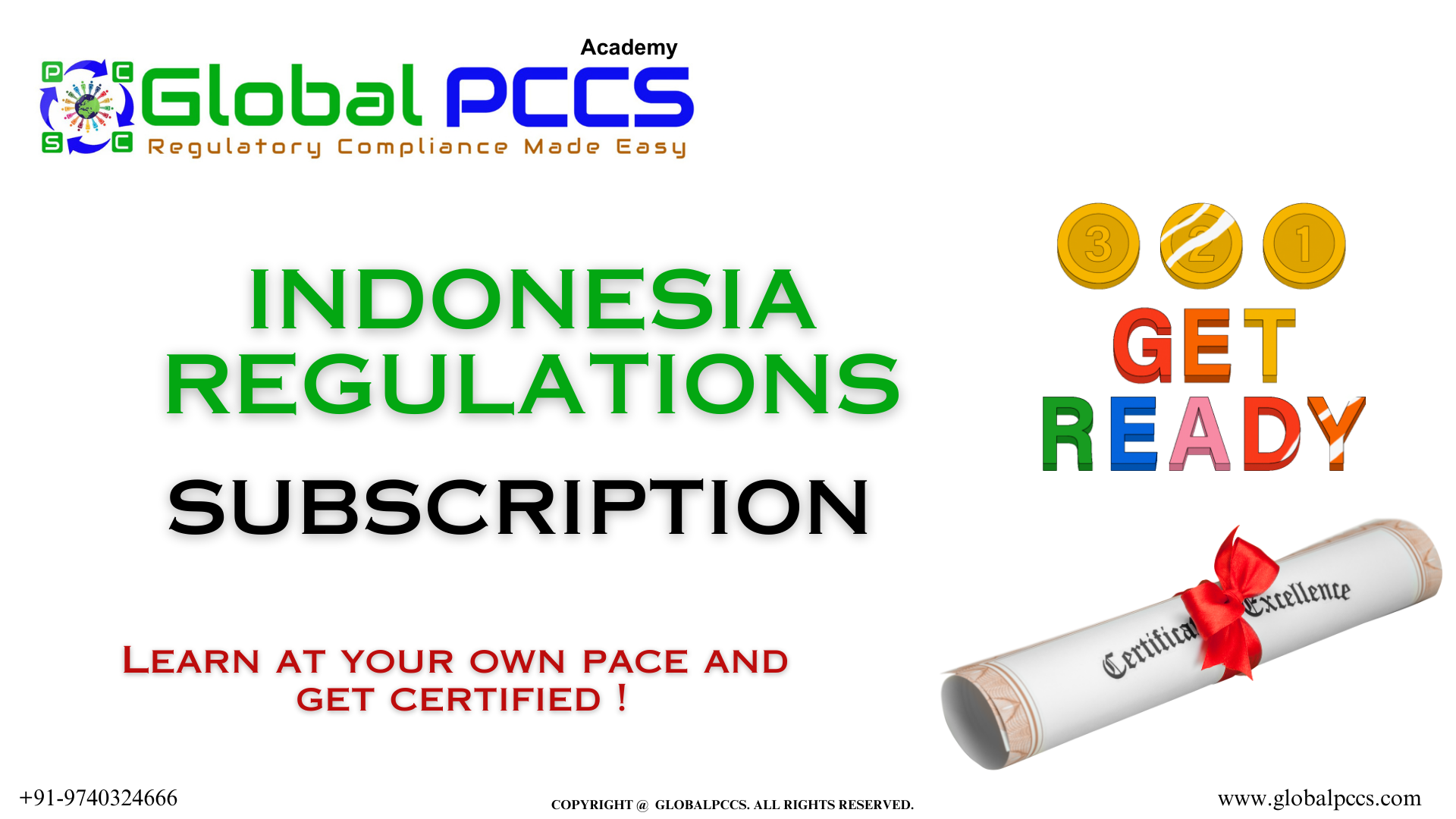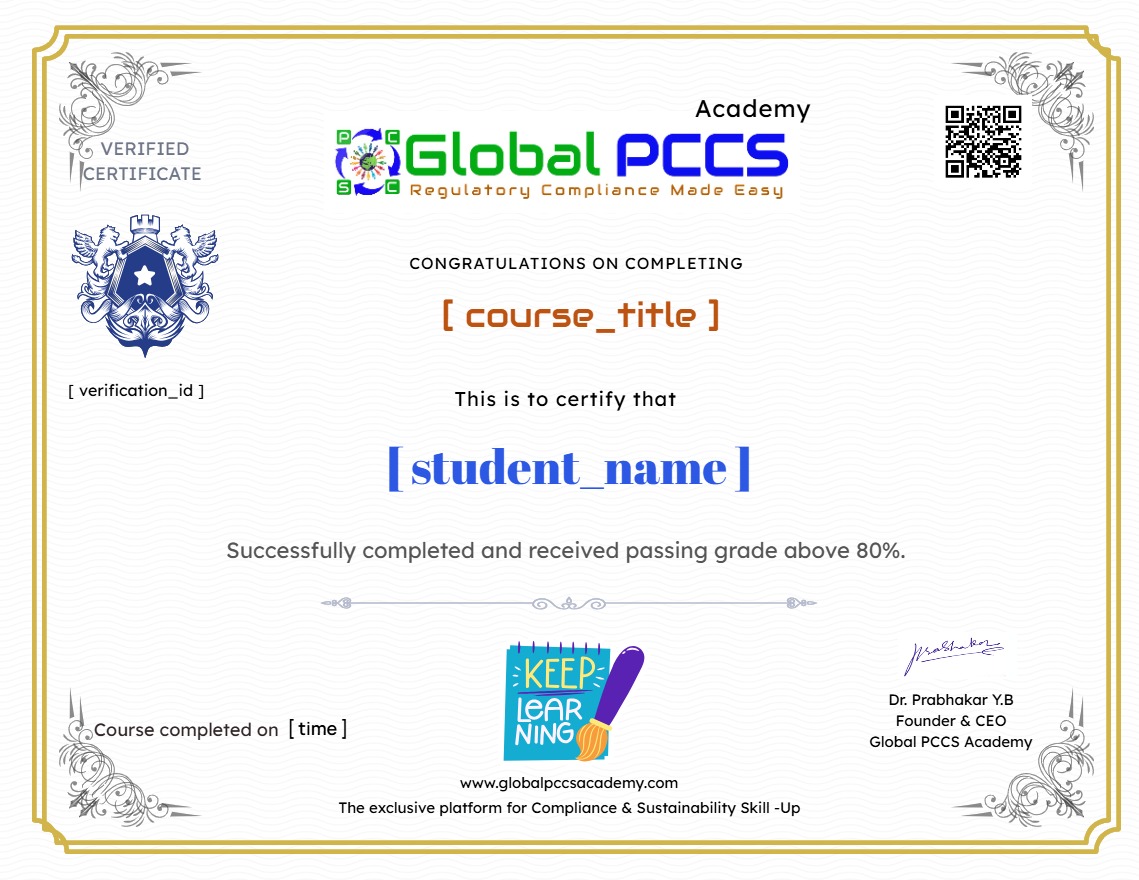Indonesia Regulations – Subscription
Categories: Compliance, Indonesia

About Course
Indonesia Regulations
Indonesia has established regulations governing the management, use, and disposal of materials and chemicals. Key aspects of material and chemical regulations in Indonesia include:
- Law on Hazardous and Toxic Materials Management (Law No. 32/2009):
- This law regulates the management of hazardous and toxic materials, covering their production, use, storage, transportation, and waste disposal.
- Government Regulation on the Control of Hazardous and Toxic Materials (PP No. 74/2001):
- PP No. 74/2001 provides detailed provisions for the control and management of hazardous and toxic materials, including labeling requirements and safety data sheets.
- Environmental Impact Assessment (EIA):
- Projects involving the use of hazardous materials may be subject to environmental impact assessments to evaluate potential environmental consequences.
- Occupational Health and Safety (OHS) Regulations:
- OHS regulations address workplace safety, including the handling of hazardous materials, to protect the health and well-being of workers.
- Customs Regulations:
- Customs regulations include requirements for the import and export of chemicals, ensuring compliance with national standards.
- Waste Management Regulations:
- Regulations govern the management and disposal of hazardous waste generated from the use of chemicals.
- Labeling and Packaging Requirements:
- Specific regulations may dictate labeling and packaging standards for hazardous materials, ensuring clear communication of hazards.
- Ministry of Environment and Forestry (KLHK):
- The KLHK oversees environmental regulations and may play a role in the implementation and enforcement of chemical management regulations.
- Product Registration:
- Certain chemicals and products may require registration with relevant authorities to ensure compliance with safety and environmental standards.
- National Standards (SNI):
- Compliance with national standards, such as SNI, may be required for various products, including those involving chemicals.
Businesses operating in Indonesia need to be aware of and comply with these regulations to ensure the responsible use of materials and chemicals, protect the environment, and adhere to health and safety standards. Specific details and updates should be obtained from relevant Indonesian government authorities and regulatory bodies.
What Will You Learn?
- Indonesia's material and chemical regulations provides insights into a regulatory framework aimed at ensuring safety, environmental protection, and product quality. Key learnings include understanding regulations governing the production, storage, and transportation of hazardous chemicals. Compliance with labeling, safety data sheets, and workplace safety measures ensures responsible chemical use. The Indonesian Ministry of Environment and Forestry plays a crucial role in overseeing environmental impact assessments. Awareness of waste management regulations contributes to proper disposal practices. Businesses gain knowledge on risk assessments, regulatory compliance, and sustainable chemical management, fostering safe and environmentally conscious practices in Indonesia's evolving regulatory landscape.
Course Content
Indonesia Regulation List
-
Indonesia Regulation List
Automotive Industry Regulation List
1. Vehicle Type Approval (BKKB) Regulation.
2. Domestic Component Level (TKDN) Regulation.
3. BEV (Battery Electric Vehicle) Regulation
-
Automotive Industry Regulation List
Vehicle Type Approval (BKKB) Regulation
Vehicle Type Approval (BKKB) Regulation:
The Vehicle Type Approval (BKKB) regulation in Indonesia is a crucial process for any new vehicle model to be legally sold and registered in the country. It involves extensive testing and compliance with safety, emissions, and other technical standards set by the Ministry of Transportation (Kemenhub).
-
Latest Updates on ELV Regulation
00:47 -
Regulation Introduction
-
Restricted Substances
-
Penalties
-
How to comply Regulation ?
-
End-of-Life Vehicles (ELV) Directive
Domestic Component Level (TKDN) Regulation
Domestic Component Level (TKDN) Regulation:
The Domestic Component Level (TKDN) regulation in Indonesia plays a crucial role in promoting local industry development and boosting the use of domestically produced components in various manufactured goods, including automobiles.
-
Latest Updates on REACH Regulation
-
Regulation Introduction
-
Industries affected from the Regulation
-
Penalties
-
How to comply Regulation ?
BEV (Battery Electric Vehicle) Regulation
BEV (Battery Electric Vehicle) Regulation:
The implementation of Battery Electric Vehicle (BEV) rules by the Indonesian government signifies a noteworthy transition towards environmentally-friendly transportation and a dedication to curtailing carbon emissions. This decision puts Indonesia in a position to potentially compete in the growing BEV market and is consistent with the worldwide trend towards electric mobility.
-
Latest Updates
-
Regulation Introduction
-
Industries affected from the Regulation
-
Penalties
-
How to comply Regulation ?
Law on Hazardous and Toxic Materials Management (Law No. 32/2009)
Law on Hazardous and Toxic Materials Management (Law No. 32/2009):
The Law on Hazardous and Toxic Materials Management (Law No. 32/2009) in Indonesia plays a crucial role in protecting the environment and human health from the risks associated with hazardous and toxic materials (B3).
-
Latest Updates
-
Regulation Introduction
-
Restricted Substances
-
Industries affected from the Regulation
-
Penalties
-
How to comply Regulation ?
B3 Management Regulation
B3 Management Regulation:
Government Regulation No. 74/2001 on Hazardous and Toxic Substances Management (PP No. 74/2001) is the primary regulation governing the control of hazardous and toxic materials (B3) in Indonesia. It predates Law No. 32/2009 you mentioned earlier, but both work together to form a comprehensive framework for B3 management.
-
Latest Updates
-
Regulation Introduction
-
Restricted Substances
-
Industries affected from the Regulation
-
Penalties
-
How to comply Regulation ?
Occupational Health and Safety (OHS) Regulation
Occupational Health and Safety (OHS) Regulation:
One of the most important aspects of guaranteeing workers' safety in Indonesia is the implementation of Occupational Safety and Health (OSH) standards.
-
Latest Updates
-
Regulation Introduction
-
Restricted Substances
-
Industries affected from the Regulation
-
Penalties
Customs Regulations
Customs Regulations:
Indonesia's customs laws are essential for controlling the movement of commodities across its borders while maintaining the country's security, environmental preservation, and economic growth in balance.
-
Latest Updates
-
Regulation Introduction
-
Restricted Substances
-
Industries affected from the Regulation
-
Penalties
-
How to comply Regulation ?
Law on Waste Management
Law No. 18/2008 on Waste Management:
Law No. 18/2008, the Waste Management Law, is the foundation of Indonesia's contemporary waste management system. The 2008 law establishes fundamental concepts, duties, and goals for addressing waste generation and its environmental effects.
-
Latest Updates
-
Regulation Introduction
-
Restricted Substances
-
Industries affected from the Regulation
-
Penalties
-
How to comply Regulation ?
Law on Consumer Protection
Law No. 8/1999 on Consumer Protection
-
Latest Updates
-
Regulation Introduction
-
Restricted Substances
-
Industries affected from the Regulation
-
Penalties
-
How to comply Regulation ?
Regulation on Product Labeling and Advertising
Regulation No. 73/2015 on Product Labeling and Advertising
-
Latest updates
-
Regulation Introduction
-
Restricted Substances
-
Industries affected from the Regulation
-
Penalties
-
How to comply with the regulation?
Regulation on Implementation of Domestic Waste Management
Regulation No. 81/2012 on Implementation of Domestic Waste Management
-
Latest updates
-
Regulation Introduction
-
Restricted Substances
-
Industries affected from the Regulation
-
Penalties
-
How to comply with the regulation?
Regulation on Reduction of Single-Use Plastic Bags
Regulation No. 128/2019 on Reduction of Single-Use Plastic Bags
-
Latest updates
-
Regulation Introduction
-
Restricted Substances
-
Industries affected from the Regulation
-
Penalties
-
How to comply with the regulation?
Law on Forestry
Law No. 41/1999 on Forestry
-
latest updates
-
Regulation Introduction
-
Restricted Substances
-
Industries affected from the Regulation
-
Penalties
-
How to comply with the regulation?
Regulation on Management of the Forestry Sector
Regulation No. 3/2020 on Management of the Forestry Sector
-
Latest updates
-
Regulation Introduction
-
Restricted Substances
-
Industries affected by Regulation
-
Penalties
-
How to comply with regulation?
Law on Environmental Protection and Management
Law No. 32/2009 on Environmental Protection and Management
-
Latest updates
-
Regulation Introduction
-
Restricted Substances
-
Industries affected from the Regulation
-
Penalties
-
How to comply with the regulation?
Regulation on Management of Hazardous Waste
Regulation No. 82/2001 on Management of Hazardous Waste
-
Latest updates
-
Regulation Introduction
-
Restricted Substances
-
Industries affected from the Regulation
-
Penalties
-
How to comply with the regulation?
Regulation on Emission Standards for Stationary Sources
Regulation No. 14/2019 on Emission Standards for Stationary Sources
-
Latest updates
-
Regulation Introduction
-
Restricted Substances
-
Industries affected from the Regulation
-
Penalties
-
How to comply with the regulation?
Law on Conservation of Living Natural Resources and its Ecosystem
Law No. 5/1990 on Conservation of Natural Resources and Ecosystems
-
Latest updates
-
Regulation Introduction
-
Restricted Substances
-
Industries affected from the Regulation
-
Penalties
-
How to comply with the regulation?
Regulation on Conservation of Plant and Animal Species
Regulation No. 7/1999 on Conservation of Plant and Animal Species
-
Latest updates
-
Regulation Introduction
-
Restricted Substances
-
Industries affected from the Regulation
-
Penalties
-
How to comply with the regulation?
Earn a Certificate & Up-skill yourslef
Add this certificate to your CV to demonstrate your skills & increase your chances of getting noticed & promoted.

Student Ratings & Reviews

No Review Yet